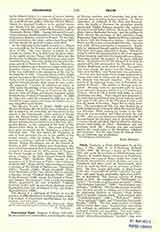

Pescennius Niger , Emperor of Rome (193-194). He was a native of central Italy, and during the reigns of Marcus Aurelius and Commodus had kept the Germans from invading Roman territory. In 192 he suppressed an outbreak of the Jews and Saracens. After the death of Pertinax the praetorian guards proclaimed Didius Julianus emperor; the troops in Britain elected Clodius Albinus; those on the Danube chose Lucius Septimius Severus; and the soldiers in Syria elected the governor of that province, Caius Pescennius Niger Justus. Septimius Severus advanced to Rome with the Pannonian legions. Julianus was killed, and the senate acknowledged Severus. Severus now made Albinus practically a co-emperor. Forth-with he addressed himself against Pescennius Niger. The latter had many adherents at Rome. Moreover, Antioch, where the proclamation of the rival emperor had been issued, aspired to the same position as Rome. Pescennius gained the support of the petty Oriental rulers. In preparation for the advance of Severus he appointed the able proconsul of the Province of Asia, Asellius Aemilianus, as his chief of staff. The ports of Asia were closed; the passes over the Taurus mountains were fortified; and Byzantium was garrisoned.
Severus also had made far-reaching preparations. Troops were sent to Africa and the seasoned army of the Danube was brought together. The advance guards of the opposing armies met at Perinthus, the capital of Thrace. The soldiers of Severus were repulsed. Severus, however, proceeded with his main army across the Bosporus and by way of Candeto near Cyzicus. Here in 194 a battle took place in which Aemilianus was slain. Niger himself now hastened to the scene but was defeated near Nicaea, with the result that most of the cities of the Province of Asia came into the hands of Severus. Niger fled to reach Antioch. The possession of this city was decided by a battle fought south of Issus in which Pescennius Niger was defeated. While making his escape to the Parthians he was overtaken and killed towards the end of 194. His severed head was exhibited by order of Severus before the besieged city of Byzantium. Severus mercilessly punished Niger’s adherents, whether private individuals or cities. Byzantium did not surrender until 196. Severus was also successful against the vassal states of the Parthians, Adiabene and Osrhoene. For the time being the Roman Province of Osrhoene was established.
KARL HOEBER

